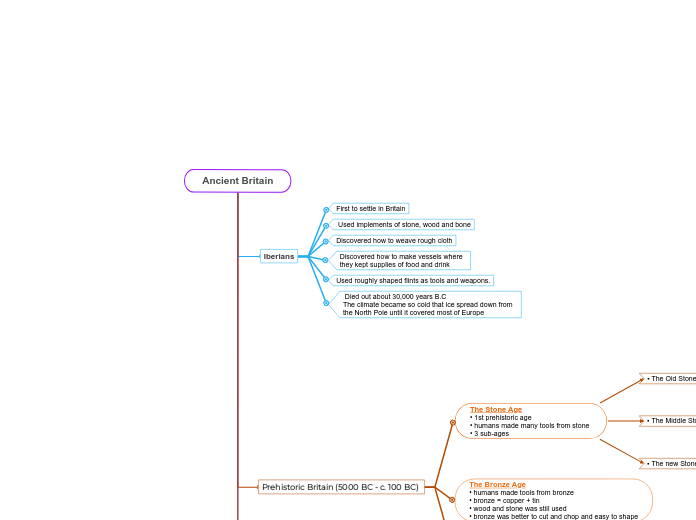Ancient Britain
Iberians
First to settle in Britain
Used implements of stone, wood and bone
Discovered how to weave rough cloth
Discovered how to make vessels where they kept supplies of food and drink
Used roughly shaped flints as tools and weapons.
Died out about 30,000 years B.C
The climate became so cold that ice spread down from the North Pole until it covered most of Europe
Prehistoric Britain (5000 BC - c. 100 BC)
The Stone Age
• 1st prehistoric age
• humans made many tools from stone
• 3 sub-ages
▪ The Old Stone Age (Paleolithic)
2.6 million years ago
Ended 15000 BC
Started the invention of tools made from stone such as hand axes
▪ The Middle Stone Age (Mesolithic)
Began at the end of the Paleolithic
Ended with the introduction of agriculture
Handmade tools and objects found in nature
▪ The new Stone Age (Neolithic)
Began at the end of the Mesolithic period
Rise of Farming
Ended with the invention of metal tools
The Bronze Age
• humans made tools from bronze
• bronze = copper + tin
• wood and stone was still used
• bronze was better to cut and chop and easy to shape
The Iron Age
• humans made tools from iron
• gold, tin and copper, were used for ornaments
• copper + small portion of tin = much harder metal
• Is likely ppl atracted to England → copper and tin were found together
Stonehenge
Invations
Three waves of Invation
The Gaels
•The first to arrive (600 BC)
• Took possession of the North of the island
The Brythons
• Second wave of Celtic people (400 BC)
• Took possession of the south of the island
The Belgic
• Last wave to come (150 BC)
• Brought over heavy iron ox ploughs (arados)
• From the “Belgic” lands of northeastern France
• Not pure Celtic race - mingled with the Germans
Main Characteristics
•loosely tied by similar language, religion, and cultural expression
• were not centrally governed
• were the most advanced regions of the Celtic Civilization (in Britain)
located in the south and south-east →
